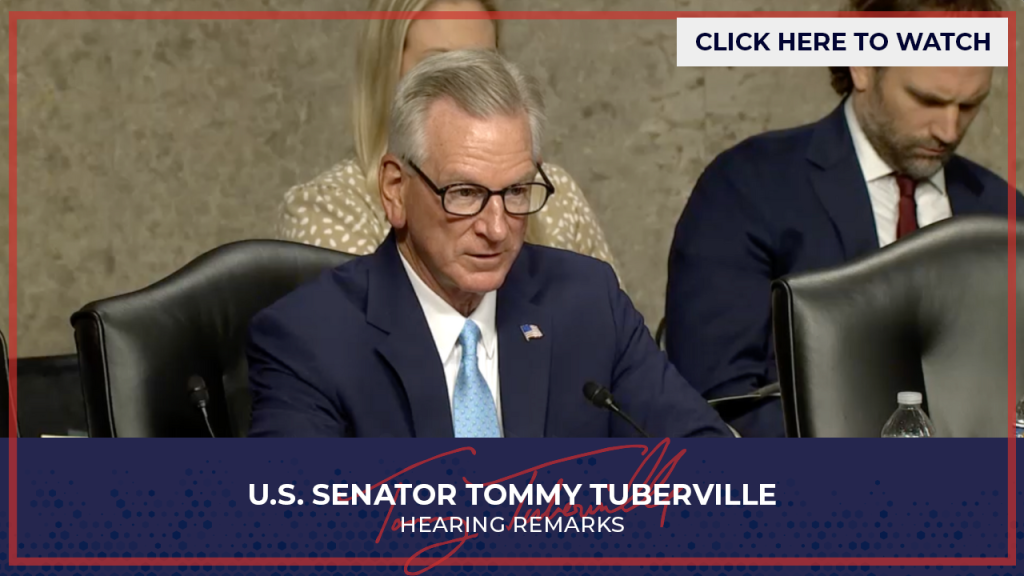WASHINGTON – Today, U.S. Senator Tommy Tuberville (R-AL) spoke with Vice Admiral Frank Bradley, President Trump’s nominee to be Admiral and Commander of U.S. Special Operations Command (SOCOM) and Lt. Gen. Dagvin Anderson, President Trump’s nominee to be General and Commander of U.S. Africa Command (AFRICOM) during their Senate Armed Services Committee (SASC) nomination hearing. They discussed SOCOM’s military operations in Panama and Latin America to combat narco-terrorism and secure our southern border, along with the strategic need for having a military presence in Africa.
Read Sen. Tuberville’s remarks below or on YouTube or Rumble.

TUBERVILLE: “Thank you, Mr. Chairman. Good morning.
Thanks [to] both of you. Thanks for what you’ve done for our country over your careers—you and your family. What a sacrifice it’s been, but you’ve done an outstanding job.
ON SOCOM EFFORTS TO COMBAT NARCO-TERRORISTS:
“Admiral, I think [for] far too long, we’ve had our eyes on other things and not on our hemisphere—whether it’s illegal migrants, drugs, or both. So, what is [the] Special Operations community doing to assist the militaries and governments in our hemisphere like Panama to combat narco-terrorists?”
BRADLEY: “Senator, in my current capacity, I’m not privy to all of the activities that SOCOM is engaged in, in the Southern Hemisphere. But in listening and watching General Fenton and his leadership over these last three years, I know that the partnerships that our teams have been engaging in and developing remain critical to being able to help them build capacity, to be able to defend themselves, but also to provide security locally, which, of course, helps to prevent and secure our Southern border as well.”
TUBERVILLE: “Yeah, I’m sure you’re up on the point of the Darién Gap and the problems that’s caused over the years, and relationship with our Special Ops, down in that area—training people—that will probably be in your forte going forward. What’s your thoughts about cooperation activities with Latin America as [you’re] going into this job?”
BRADLEY: “Yes, sir. I think as the counterterrorism fight informs us, it is far better to find the root of the problem well away from our borders than it is to have to defend them internal to the United States. And so, if confirmed, making it a priority to provide assistance to all of our combatant commanders as far forward as possible, and with those partnered forces to help them to be able to secure their own territory.”
ON AMERICAN MILITARY PRESENCE IN AFRICA:
TUBERVILLE: “Yeah, and we and we have problems all over the world. But if we don’t watch our back door, then we’re gonna [really have] problems within our country, which we already have. General, I think we need to be reinforcing our military presence in Africa. Unfortunately, under the previous administration, we seemed like we were doing just the opposite. Niger—you and I talked about this in a meeting in my office—the vacuum that was caused there. China, Russia, Iran, were all too happy to feel the things that we were doing there. What’s your assessment of our withdrawal from Airbase 201? And have we learned from these lessons? And your thoughts about maybe the future there?”
ANDERSON: “Senator, I appreciate that question and there was a significant investment that went into that airbase. It was in a key area for us to be able to monitor the threat. So, the loss of that is one that we have to find creative ways to continue to get the indicators and warnings of what the terrorists are doing in that area. I think we also have to understand that there is some volatility across the continent. So how do we make smart investments with the partners that we can continue to sustain. I will say that the relationships that we built in Niger with the military over several decades are still there. There is—when the time is right—I believe there will be an opportunity, but that time will have to be determined. And if confirmed, I’ll look at what that is.”
TUBERVILLE: “Yeah. After your confirmation, I guess, by telling committee and people even watching at home—why do we need to have [a] presence in Africa? What [are] your thoughts?”
ANDERSON: “So, Africa is key to any strategy. It’s just on strategic terrain. It’s just the waterways that it forms between the Strait of Gibraltar all the way down to the Suez Canal and the Red Sea. It [has] critical minerals and resources that are on the continent that we need for the future economy. Both China and Russia see their strategies going through the continent, and they are going to engage there and so we can cede that ground or we can compete in that ground. And I think we have a very powerful tool to compete with. As Admiral Bradley mentioned, nobody brings more credibility to the counterterrorism fight than the U.S. As a matter of fact, when we rescued that hostage in Niger, the next morning [there was an] influential blogger that posted, ‘The Americans came like the lion in the night. They killed their enemies and rescued their own.’ No other nation on Earth could do that.And that is a powerful symbol across the continent and around the world of what our military and what the United States is capable of. And I do think that some level of engagement in Africa does matter. I’d agree it’s an economy of force, but a small investment goes a long way so that we don’t have a strategic surprise that then distracts the United States from focusing on the rising threats in the Pacific and other areas.”
TUBERVILLE: “Thank you. Thanks Mr. Chairman.”
Senator Tommy Tuberville represents Alabama in the United States Senate and is a member of the Senate Armed Services, Agriculture, Veterans’ Affairs, HELP and Aging Committees.
###